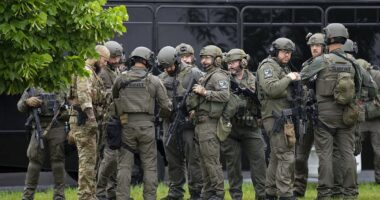Some educational materials being promoted to schools are claiming that Stonehenge was constructed by black individuals and that the Roman Emperor Nero was married to a transgender woman. These claims were highlighted by a think-tank.
Pro-transgender teaching materials also claim that genital mutilation of slaves was a form of ‘gender transition’.
Despite this, significant British historical events like the victories at Waterloo and Trafalgar are reportedly not receiving enough emphasis in schools. Research indicates that as few as one in ten schools are incorporating these events into their curriculum.
An investigation conducted by Policy Exchange has raised concerns about the direction that schools are taking with their history curriculums. The investigation suggests that adjustments made in response to the Black Lives Matter movement may have gone too far.
The prestigious centre-Right unit found that George Floyd’s death in 2020 led to schools hastily including material about ethnic minorities to appear ‘anti-racist’.
Former history teacher and chairman of Campaign for Real Education Chris McGovern said it was ‘clear that the subject has been captured by the Left’.
The report added that some resources, such as the book Brilliant Black British History, push ‘contested narratives’ – such as black people building Stonehenge.
The book is marketed as ‘a must-have in any school library’ but its claim that early black Britons built the world-famous Neolithic stone circle is ‘hotly contested and outside mainstream historical thinking’ yet ‘presented as fact’, according to the think-tank.

A history book promoted to schools claims that Stonehenge was built by black people, a Policy Exchange investigation found

One resource, from the Classical Association’s ‘Queering the Past’ project, claims the Roman Emperor Nero married a trans woman called Sporus but omits the fact that they probably underwent a forced castration rather than consensual gender reassignment

Landmark British victories such as those at Waterloo and Trafalgar go largely untaught – with sample data suggesting as few as one in ten schools include them on the curriculum. Pictured: The Battle of Waterloo, a 1824 painting by Dutch artist Jan Willem Pieneman
While in some cases these initiatives have a ‘positive effect’, such as exposing pupils to ‘wider world history’, the report flagged serious concerns about replacing facts with biased narratives.
It warned: ‘In too many cases this process has gone too far, leading to the teaching of radical and contested interpretations of the past as fact, or with anecdotes of interesting lives replacing a deeper understanding of the core drivers of history.’
One resource, from the Classical Association’s ‘Queering the Past’ project, claims the Roman Emperor Nero married a trans woman called Sporus but omits the fact that they probably underwent a forced castration rather than consensual gender reassignment.
It comes as the Government conducts its curriculum review to ‘reflect the issues and diversities of our society’ – which the report says may be unnecessary as schools already do it.
Backed by former education secretaries Lord Blunkett and Nadhim Zahawi, the report also calls for pupils to be impartially given a better overview of British history.
A Classical Association spokesman said its teaching resources were ‘complicated and nuanced’ where ‘more than one interpretation is possible’.
A Department for Education spokesman said: ‘The curriculum and assessment review is considering how to ensure young people have access to a broad and balanced curriculum.’
Meanwhile, Mr McGovern warned history is ‘seen as a vehicle for undermining and destroying British national identity’.
Policy Exchange’s research examined teaching resources that are promoted as being appropriate for schools.
While schools have to deliver classes according to exam board specifications, they are also allowed to source their own materials which may be produced by third party organisations.
The think tank also gathered responses to Freedom of Information requests about the curriculum sent to 249 nationally-representative secondary schools.
The responses revealed the most popular curriculum topic taught to children aged 11 to 14 was the Transatlantic Slave Trade, taught in 99 per cent of schools.
At the other end of the scale, the Battles of Waterloo and Trafalgar were taught in just 11 per cent of schools, while for Agincourt it was 18 per cent.
The data also showed 83 per cent said they had either ‘decolonised’ or ‘diversified’ their history teaching.

















